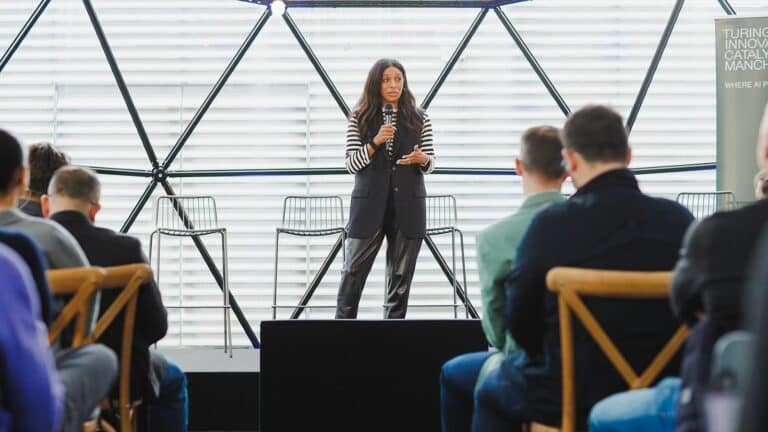In the heart of Manchester, an AI-driven revolution is quietly reshaping the way we address many of society’s most important challenges, writes Liz Scott, executive director, Turing Innovation Catalyst Manchester.
And cutting through much of the noise about how, when and why we should be embracing AI, we can see a new story unfolding: one that centres around innovative entrepreneurs using technology to make a real difference in both local communities and across the globe.
From healthcare to sustainability, many of these trailblazing businesses are showing that, far from being a threat, AI can be effectively used as a force for good.
According to recent data from Investing Strategy, there are over 1,300 AI companies throughout the UK, many currently focused on tackling societal issues such as health, the environment, and education. Greater Manchester is one of the epicentres of this movement and is proudly home to the largest AI cluster in the UK outside of London.
This groundswell of activity highlights the potential of AI to address more specific challenges like climate change and healthcare accessibility – moving the conversation around AI capabilities beyond the hype and mystique, and showing that it can deliver tangible, real-world impact.
Turning the tide with sustainable innovation
A standout example of AI’s potential in driving sustainable change is Grafmarine, a Manchester-based company focused on revolutionising the maritime industry. Grafmarine’s innovation lies in its modular, AI-driven solar energy systems, which significantly reduce maritime fuel consumption – responsible for 3% of global greenhouse gas emissions, according to the International Maritime Organisation.
By bringing together the potential of AI and advanced materials to optimise energy management on ships, Grafmarine is setting a new standard for sustainability in one of the world’s most polluting industries.
The impact of companies such as Grafmarine and its unique innovation is profound. The company not only works to cut emissions but also offers a scalable solution that could transform the global shipping industry. This AI-powered approach represents the kind of solution that goes beyond developing technology for its own sake; it addresses a clear environmental need, while continuing to drive forward the green economy agenda.
According to data from Grafmarine, its technology has the potential to reduce carbon emissions by up to 60%, demonstrating how AI can be harnessed to make a significant positive impact, contributing to global efforts to combat climate change.
Taking teachers from administration to inspiration
AI’s transformative potential extends beyond the environmental sector. In the world of education, AI is constantly reshaping how we teach and learn, enhancing experiences for both educators and students.
According to a study by McKinsey, AI-driven educational tools can reduce administrative burdens by up to 30% overall, allowing teachers to spend more time on one-on-one student interactions and developing tailored learning plans.
And it’s yet another Manchester start-up that finds itself at the forefront of this transformation.
TeachMate uses AI-led solutions to streamline administrative tasks in schools through automating time-consuming processes like marking, lesson planning, and attendance tracking – and the results speak for themselves, with the company boasting over 116,000 days of saved administrative time for over 228,000 teachers across the UK.
Figures like this point to more than AI simply boosting efficiencies. By freeing up teachers’ time, technology is allowing educators to focus on what truly matters – supporting student learning on a person-to-person level.
TeachMate’s approach spotlights this potential, shining a light on how AI can work alongside human expertise to truly enhance educational outcomes.
Redefining patient care
Healthcare is another sector in which AI is making game-changing strides.
From diagnostics to treatment planning, technologies are rewriting the potential for precision and optimising efficiencies in medical care. Machine learning algorithms can now analyse vast amounts of medical data to detect patterns that human clinicians might miss, leading to earlier and more accurate diagnoses that can save lives.
Spotlight Pathology, a startup helping blood cancer pathology departments to increase their diagnostic capacity to minimise waiting times for patients, is an exemplar in this arena. By integrating machine learning with existing digital infrastructure in healthcare settings, the company is helping to reduce pathologists’ hands-on time and enable quicker diagnoses.
According to research published by PwC, AI-driven diagnostics are set to improve patient outcomes by 40%, while reducing healthcare costs by up to 50%. A study by Deloitte also reports that AI could bridge gaps in healthcare accessibility, potentially increasing access to medical services by 20% in underserved regions. This kind of intelligent care pathway management is particularly valuable in under-resourced areas, where access to healthcare professionals may be limited.
A catalyst for societal change
The examples of Grafmarine, TeachMate and Spotlight Pathology are proof of the potential for AI to deliver real-world impact and help us in solving some of the most pressing societal challenges – but they’re just the tip of the iceberg when it comes to the potential for AI to act as a catalyst for positive change.
Across the UK, and in Greater Manchester in particular, entrepreneurs are working tirelessly to leverage AI’s power to address a growing number of real-world problems, proving that technology can indeed be a force for good.
However, realising AI’s full potential requires a balanced approach. We must, of course, continue to be mindful and meticulous when it comes to monitoring the ethical concerns surrounding AI, ensuring that it is developed and deployed responsibly.
The Turing Innovation Catalyst, and the partners we collaborate with, advocate for an AI ecosystem that prioritises societal impact, transparency, and inclusivity. By focusing on the positive applications of AI and creating new opportunities for innovation to thrive, we can move beyond the hype and pave the way for meaningful and transformative change.
As we look ahead, it is crucial that we continue supporting innovators who are working to make a difference, collectively embracing a future in which technology can actively shape a better world. By championing AI as a force for good, and not as a threat, we can meet humanity’s greatest challenges with both imagination and purpose, delivering solutions that achieve lasting impact where it matters most.












